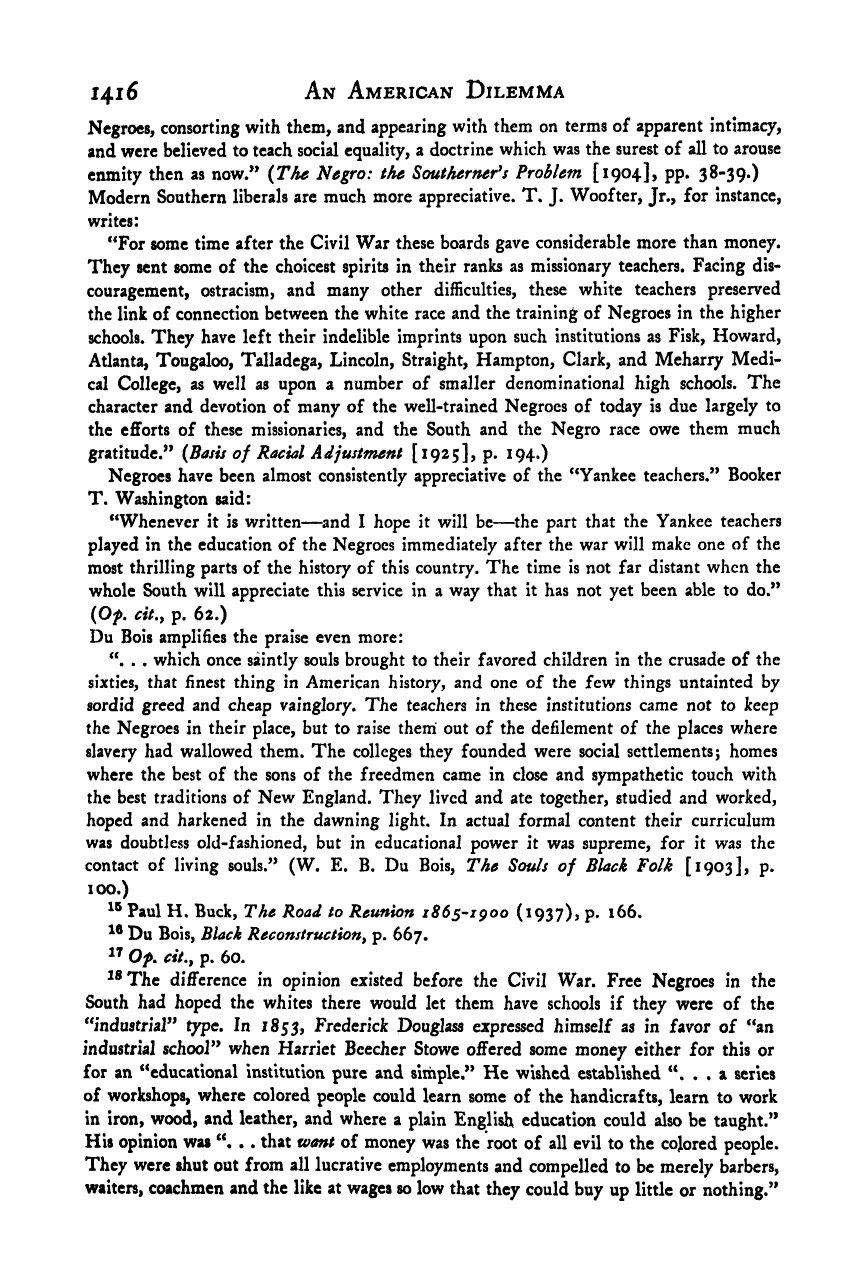Note: Gunnar Myrdal died in 1987, less than 70 years ago. Therefore, this work is protected by copyright, restricting your legal rights to reproduce it. However, you are welcome to view it on screen, as you do now. Read more about copyright.
Full resolution (TIFF) - On this page / på denna sida - Footnotes - Chapter 41

<< prev. page << föreg. sida << >> nästa sida >> next page >>
Below is the raw OCR text
from the above scanned image.
Do you see an error? Proofread the page now!
Här nedan syns maskintolkade texten från faksimilbilden ovan.
Ser du något fel? Korrekturläs sidan nu!
This page has never been proofread. / Denna sida har aldrig korrekturlästs.
1416 An American Dilemma
Negroes, consorting with them, and appearing with them on terms of apparent intimacy,
and were believed to teach social equality, a doctrine which was the surest of all to arouse
enmity then as now.” (The Negro: the Southerner’s Problem [1904], pp. 38-39.)
Modern Southern liberals are much more appreciative. T. J. Woofter, Jr., for instance,
writes:
“For some time after the Civil War these boards gave considerable more than money.
They sent some of the choicest spirits in their ranks as missionary teachers. Facing dis-
couragement, ostracism, and many other difficulties, these white teachers preserved
the link of connection between the white race and the training of Negroes in the higher
schools. They have left their indelible imprints upon such institutions as Fisk, Howard,
Atlanta, Tougaloo, Talladega, Lincoln, Straight, Hampton, Clark, and Meharry Medi-
cal College, as well as upon a number of smaller denominational high schools. The
character and devotion of many of the well-trained Negroes of today is due largely to
the efforts of these missionaries, and the South and the Negro race owe them much
gratitude.” (Basts of Racial Adjustment [1925], p. 194.)
Negroes have been almost consistently appreciative of the “Yankee teachers.” Booker
T. Washington said:
“Whenever it is written—and I hope it will be—the part that the Yankee teachers
played in the education of the Negroes immediately after the war will make one of the
most thrilling parts of the history of this country. The time is not far distant when the
whole South will appreciate this service in a way that it has not yet been able to do.”
(Of, Cit,y p. 62.)
Du Bois amplifies the praise even more:
“. . . which once saintly souls brought to their favored children in the crusade of the
sixties, that finest thing in American history, and one of the few things untainted by
sordid greed and cheap vainglory. The teachers in these institutions came not to keep
the Negroes in their place, but to raise them out of the defilement of the places where
slavery had wallowed them. The colleges they founded were social settlements; homes
where the best of the sons of the freedmen came in close and sympathetic touch with
the best traditions of New England. They lived and ate together, studied and worked,
hoped and harkened in the dawning light. In actual formal content their curriculum
was doubtless old-fashioned, but in educational power it was supreme, for it was the
contact of living souls.” (W. E. B. Du Bois, The Souls of Black Folk [1903], p.
100.)
Paul H. Buck, The Road to Reunion 1865-1900 (1937), p. 166.
Du Bois, Black Reconstruction
y
p. 667.
Of, cit,y p. 60.
^®The difference in opinion existed before the Civil War. Free Negroes in the
South had hoped the whites there would let them have schools if they were of the
“industrial” type. In 1853, Frederick Douglass expressed himself as in favor of “an
industrial school” when Harriet Beecher Stowe offered some money either for this or
for an “educational institution pure and simple.” He wished established “. . . a series
of workshops, where colored people could learn some of the handicrafts, learn to work
in iron, wood, and leather, and where a plain English education could also be taught.”
His opinion was “• . . that toant of money was the root of all evil to the cojored people.
They were shut out from all lucrative employments and compelled to be merely barbers,
waiters, coachmen and the like at wages so low that they could buy up little or nothing.”
<< prev. page << föreg. sida << >> nästa sida >> next page >>